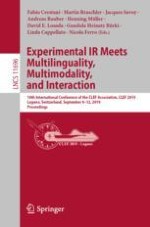2019 | OriginalPaper | Chapter
Efficient Answer-Annotation for Frequent Questions
Authors : Markus Zlabinger, Navid Rekabsaz, Stefan Zlabinger, Allan Hanbury
Published in: Experimental IR Meets Multilinguality, Multimodality, and Interaction
Publisher: Springer International Publishing
Activate our intelligent search to find suitable subject content or patents.
Select sections of text to find matching patents with Artificial Intelligence. powered by
Select sections of text to find additional relevant content using AI-assisted search. powered by
